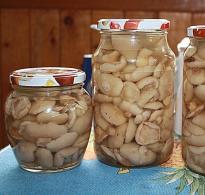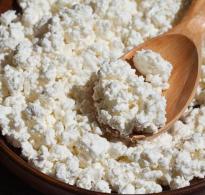Raw eggs float in water or sink. How to check the freshness of eggs at home
Every housewife knows that an egg lies at the bottom during cooking, so if suddenly raw eggs float in water, there must be well-founded doubts about the quality of the product.
Unfortunately, it is difficult in a store, especially in supermarkets, where goods are offered in closed container. But at home while cooking, you can and should find out this question.
The following points should raise suspicions:
- bad smell hydrogen sulfide,
- protein opacity.
To ensure freshness, it is not necessary to break the product.
If eggs float in water
You need to put it in a pan of water, and if eggs floated into cold water or during cooking, which means they have spoiled.

Why is this happening?
Many people mistakenly believe that the egg is hermetically sealed.
- In fact, there are pores in the shell through which air enters the chick. But along with it can also come microorganisms that cause putrefactive processes, as well as the release of gases. The gases are lighter than water, so they push the egg to the surface.
An old egg, even if it is edible, will float in any case, since air accumulates over time between the shell and the albumen.
- If you threw an egg into water and it immediately sank to the bottom in a horizontal position, then the product is fresh.
- If it floats up blunt end Therefore, it is a week old, and irreversible processes have occurred inside, due to which the yolk and white have become more liquid. But you can still eat.
- If the egg has taken a vertical position, it is about two to three weeks old. A completely floated product is more than a month old, and it is not recommended to eat it.

It is worth remembering that salt added during cooking will not reliably determine the freshness of the product, since salt makes the water denser, and a floating egg may not necessarily be spoiled.
But if it remains lying at the bottom, then there are doubts about its usefulness and good taste it can't be.
VIDEO ON THE TOPIC
Not only chicken, but also if they are no longer suitable for food.
To avoid becoming a victim of a low-quality product, you can try to determine the degree of freshness before purchasing it.

- Best before date. It is different for each product class. So, for dietary eggs it is up to 8 days, for table eggs, which are the most common, up to a month, for long-life eggs - up to six months.
- Shell. It should be a little rough and without gloss. It is smooth only on a stale product.
- Weight. Take the product in your hand. If it’s light, it means it’s already stale.
- Shake the egg. If something seems to be loose inside and you hear slight sounds, then the product is not fresh.
In order to avoid damage to an already purchased product, you should follow simple rules.
- Do not buy a product with cracks in the shell.
- Store them only in the main compartment of the refrigerator, not in the door, as opening the door causes a temperature change.
- To store eggs, choose a separate container so that the product does not come into contact with other contents of the refrigerator.
- The optimal humidity for maintaining freshness is from 75 to 85%.
- If the shelf life of a chicken egg is up to three weeks, then a quail egg is up to 40 days at a temperature from 0 to 20 degrees, and at a temperature from 0 to 15 degrees – up to 60 days.
- If the egg was hard-boiled, it can be stored for up to 7 days.
- The longer a product is stored at low temperatures, the less vitamins remain in it.
If you have doubts about the quality of an egg, do not risk your health and throw it away, as food poisoning can be very serious, especially for young children.
We buy eggs at the market or supermarket. Unfortunately, it is impossible to check this product for freshness right at the counter; you have to trust the stickers with the expiration date. And only at home you can understand whether the eggs were bought fresh or not.
It is simply impossible to determine the freshness of eggs, as they say “by eye”. This product can last for a long time room temperature and no external manifestations are noticeable. Often buyers ask the seller how fresh the eggs are and the answer is always the same: “The eggs are fresh, take them.” You can check whether an egg is really fresh like this: break it and determine its freshness by its characteristic smell. If it is repulsive, then the egg is spoiled. But breaking eggs all the time is not part of our plans, so we will check the freshness of the eggs in other ways.
How to check the freshness of eggs in water
Take a large container, such as a saucepan. You need to pour cold water into it directly from the tap (no more than 10 cm), and then place the eggs in it. You can take turns so as not to get confused and determine the freshness of each product sequentially.
How to tell if eggs are fresh:
- If the eggs fall to the bottom and do not float to the top, then you are lucky - you bought fresh, fresh eggs.
- If you see that the eggs are slightly raised with the blunt tip upward, this means that the eggs are no longer very fresh. They can still be used, but not in fresh, and prepare hot dishes (pastries, scrambled eggs, omelettes).
- If the eggs float, then they are definitely spoiled and such a product is generally prohibited from being eaten. Such eggs must be thrown away immediately. Do you know why it happens that an egg floats to the surface in water? Every day the moisture gradually evaporates and this space fills with air. The older the product, the more air it contains and therefore the eggs float.
There is another similar way to test eggs: you need to pour salt into the water to make the solution concentrated. You also need to lower the eggs and look: if they lie on the bottom, then the “age” of such a product is approximately 2 to 7 days. If the egg rises with the blunt end, and the sharp end remains “glued” to the bottom, then this product is approximately 10 days old. If the eggs float in a salty solution, then such eggs are already about 2 weeks old. If the eggs float to the surface saline solution and “stick out” from it, then such eggs are prohibited from being eaten, they are not fresh.
Other ways to check eggs for freshness
An egg can be broken if one of the eggs tested in water floats, and then the white and yolk can be examined. By appearance of these components we can say the following:
- if the white is runny and the yolk has become flat, then the egg is not fresh;
- If the white is dense and viscous, and the yolk is convex, then the egg is fresh.
Another way to check eggs for freshness: you just need to shake the egg, if you don’t hear anything, then the eggs can be safely eaten, if you hear a “squish” or a splash, as well as any other sound, this means that there is air inside, which means This egg is no longer fresh and should not be eaten.


About the expiration date and storage rules for eggs
The manufacturer always indicates the expiration date of the product on the packaging. If the eggs were stored correctly, in compliance with all the rules, then they will be fresh.
What to look for when buying eggs:
- You need to buy fresh eggs, so pay attention to the expiration date of the product. If it's expired, don't take the risk.
- You need to store eggs in a cold place - in the refrigerator at a temperature no higher than +6 o C. If you keep eggs at home on the table, they will spoil faster.
- You need to cook the eggs for at least 5 minutes.
- If the expiration date has expired, then these eggs can be eaten, but only on the condition that the eggs were stored in the refrigerator and such a product must be cooked at a sufficiently high temperature (from +70 o C).
- If you see that the egg has burst, then it is prohibited to store it. It is advisable to prepare something from such a product.



The freshness of eggs is always a mystery for inexperienced housewives. The intrigue lasts until the shell breaks. But experienced home-grown cooks know: if an egg floats during cooking, there is something wrong with it. It is better to prepare the dish from other ingredients, and throw the spoiled product in the trash.
The egg floated during cooking: what does this mean?
When eggs float in the water, this is interpreted unambiguously: you have come across a product that is not the freshest. By the movement of an item in a pan, you can determine how long it has been on store shelves. To do this, pour cold water into a container and place the eggs before cooking. Wait for the local storm to subside and observe.
Housewives generally see the following stages:
- a dietary product that is no more than 8 days old lies on the bottom and does not attempt to rise to the surface;
- an egg that has lain for a week begins to move upward with its blunt end;
- A 2-3 week product hangs in a vertical position somewhere in the middle;
- the one that was taken from the chicken more than a month ago pops up completely.
See how the shelf life of a product is visually determined. This is exactly how eggs of varying freshness behave in cold water.
These characteristics apply to chicken, quail eggs. The results of the experiment are reliable; it is impossible to make a mistake in determining freshness. Unless you start using boiled egg instead of raw or salt water. Salt increases the density of the liquid, the experiment will change under such conditions.
The following situation occurs: you are sure that the specimen is fresh, but it still pops up. There is no need to scold the experiment, just examine the egg. There are probably cracks in the shell through which air has entered. It is also better not to eat this as food - it is unknown how the bacteria that penetrated inside affected the quality of the protein and yolk.
Why do eggs float in water?
The question can be answered with the same simple observation. As soon as the opportunity arises, compare 2 products: only from poultry and from storage. They will have a couple of significant differences that cause the eggs to float to the surface.
What does it mean? The properties change because the shell is not airtight. It has pores that allow oxygen and microorganisms to pass through so that the potential chick has the opportunity to survive. A certain environment is formed inside the product. If it is not cooled in time or thermally treated, pathological microorganisms will take over.
Why does it pop up? During storage, eggs lose moisture. carbon dioxide. The protein becomes more liquid and takes up less space. An air chamber is formed inside - a puga. It causes the lying eggs to tend to the surface of the water.
Why does an egg float in water when boiled?
Even during heat treatment fresh egg may change position relative to the bottom. This does not mean that the product has suddenly spoiled. The bug is to blame again - it is the main reason that the boiled egg floated after cooking.
Under the influence high temperature the white and yolk coagulate. Their volume decreases, excess moisture evaporates, and air takes up the free space. The chamber pushes the product out of the water after cooking.
Is it possible to eat eggs that float in water?
If an egg floats in water during cooking, its further fate depends on its freshness. A completely floated product should not be eaten. Immediately add this to your cart. It is allowed to eat something that has been sitting for 2-3 weeks, only the egg must be boiled until full readiness. It is better not to poach or scrambled eggs with semi-liquid yolk and white. Health is more valuable.

Feel free to eat daily and weekly specimens. First of all, try to use the latter so as not to spoil. To avoid unpleasant consequences, choose dishes that require high-quality heat treatment of eggs - salmonella is also found in the freshest eggs.
Consequences of eggs floating in water when boiled
If the explanation of the reasons why an egg floats during cooking does not seem convincing and you don’t want to give up spoiled eggs, pay attention to the consequences of eating them. Yes, the product may have a normal appearance and smell, but the freshness test warns that pathological changes inside are already in full swing. If you eat it, you risk serious poisoning.
The latter appears 6-8 hours after eating. Depending on the degree of damage to the body, symptoms may vary:
- nausea, severe, frequent vomiting;
- abdominal pain - nagging, in the form of colic, cramps;
- lack of appetite;
- diarrhea, in the worst case - mixed with mucus and blood;
- general weakness, chills, inability to sleep;
- increase in temperature;
- dizziness;
- dehydration;
- numbness of the limbs.
If something like this occurs, you should immediately seek medical help, otherwise the consequences can be dire. This is especially true for egg poisoning in children. As a self-medication, it is only useful to induce vomiting and rinse the stomach until the ambulance arrives. If you have a home, you can also drink a sorbent like activated carbon, enterosgel. The drugs will reduce the number of pathogenic organisms and alleviate suffering.

If you feel so sorry for the money you spent that you are ready to eat a spoiled product, learn to determine its freshness in the store. To do this, it is useful to remember 5 basic rules. They will not allow sellers to deceive you or inadvertently choose an item that has been lying around.
- Check shelf life. On the box, each copy must be stamped with production and expiration dates.
- Buy the product from trusted places that have quality certificates. Buying eggs from neighbors, at a farmer's market, or from dear grandmothers is a tempting idea. But where are the guarantees that the birds are healthy and that the goods have not lain in the owner’s refrigerator for a couple of weeks?
- Use an ovoscope. In large supermarkets, next to the egg shelf there is a device for determining freshness.
- Look through the product into the light. If you don’t have an ovoscope, use any other light source. A fresh specimen is completely translucent and has no inclusions. The two-week old one usually has thin veins, while the monthly one has dark spots.
It is difficult to guess whether you bought fresh eggs, because it is impossible to look under the shell without breaking it, and it reliably hides the sight and smell of the contents. And yet there is a way out. It turns out that you can easily and quickly determine the freshness of this valuable product using... plain water.
Unusual product, which hides many secrets. For example, many people think that the shell is impenetrable, but this is not at all true, otherwise how can the chick breathe? The coating has micropores, invisible to the naked eye, and allows air to pass through.  And since there is a hole, there is access for microorganisms. It is because of harmful bacteria that the egg can spoil.
And since there is a hole, there is access for microorganisms. It is because of harmful bacteria that the egg can spoil.
So, let's figure it out: how to determine the degree of suitability of a product without breaking the shell? We are not talking about ultra-modern electronic devices. We only need a glass of water and a “test” testicle.
Which egg doesn't float?
When we need to cook this product soft-boiled or hard-boiled, we take a pan and immerse it in cold liquid required quantity eggs Attentive housewives have noticed more than once that they usually immediately sink to the bottom, and this is the norm. Fresh chicken product always falls to the bottom.
Did you know? Chicken is the most common bird on Earth.
Let's figure out why this happens. The fact is that the activity of microorganisms always contributes to the release of gas, and gas is lighter than water, which is a liquid. And since the product is fresh and there are no harmful bacteria inside it in dangerous quantities, there is no gas in it either.
If, after immersing an egg in a container of water, you see that it is hovering in the middle, between the bottom and the surface, do not be upset and angry with the seller for the stale product.  It is indeed not the first freshness, but it is edible and not at all dangerous.
It is indeed not the first freshness, but it is edible and not at all dangerous.
The fact is that air has already managed to pass through the pores and accumulate between the shell and the thin film (when the shell is broken, it is visible to the naked eye). This phenomenon did not harm the product at all and did not deteriorate its quality.
Which egg floats with its blunt end
Raising the egg to the surface of the water with a blunt end indicates that such a product is already a week old and there is a certain vital activity of microorganisms inside it, which has made the contents less liquid (thickening it), but it is still suitable for consumption.
The main thing is to eat it as quickly as possible.
Did you know? Tiny hummingbird blows away the world's smallest bird eggs- their diameter is about 12 mm.
If the egg has completely floated to the surface, your breakfast is most likely ruined, because enough gases have accumulated in it to push the not-so-light product out of the water.
However, you can do another test: break it into a separate bowl. If there is no characteristic unpleasant odor- this means the product can still be eaten. If the egg has an unpleasant, pungent odor, there will be no doubt - it is finished. 
Floating in salt water
There is an opinion that adding salt to the water before cooking will help maintain the integrity of the shell while it is heated.
Important! The protein-yolk substance is capable of absorbing flavors through the shell.
However, if you decide to check the freshness of the egg directly in the pan, you cannot salt the water. Salt will change chemical composition water, which will increase the density of the liquid. The result will be inaccurate: a fresh egg dipped in salty liquid will not float to the surface.
Video: how to check the freshness of an egg using water
So, you can determine the freshness of eggs without even violating their integrity. This is very important, because when buying them even from the most familiar and trusted seller, you need to remember that no one is immune from mistakes.
A spoiled egg poses serious health problems, so it is better to dip the egg in cold, non-salted water before each meal for a tasty and, most importantly, safe breakfast.
The sacred property of water, which our ancestors knew about and which we have forgotten for some reason, is that water does not absorb any nasty things - everything bad will certainly float up in the water. You can always check the quality of the eggs. To do this, pour cold water into a deep bowl. clean water and put raw eggs into it. This is how they usually check chicken eggs, and quail eggs too.
A fresh egg always sinks to the bottom in water, but a bad one will float to the surface. Floated eggs cannot be eaten in any form; they can only be thrown into the trash. This is how I always determine the freshness of eggs at home. This is an ancient method of our ancestors, which can be used in our time.
Why shady egg floats in water?
A small space at the blunt end of the egg is filled with air for gas exchange in the embryo. The two-layer shell shell in this chamber allows air and moisture to pass through. The older the egg, the more air accumulates over time at the blunt end of the egg. The first possible reason for the egg to rise to the surface is simple old age. Old raw eggs always float in water.
Why does a spoiled egg float in water?
The egg shell has micropores and allows air and microbes to enter. As a result, processes of rotting and protein decomposition may occur over time. As a result, gases are released, and gases are always lighter than water. The more gases, the higher the egg floats. A floating egg may indicate not only the age of the egg, but also that it may be rotten. And this is the second reason for eggs floating in water - rottenness.
If you bought eggs at the market, store, supermarket and at home they all sank in a bowl of water, then you bought good fresh eggs and you can eat or cook with them various dishes, baked goods. But floating eggs that float near the surface should be thrown into the trash to avoid poisoning.
People who at least sometimes go into the kitchen not only to eat, but also to cook something, eventually notice useful little things. For example, that eggs do not float when boiled, but lie on the bottom. Therefore, the vague suspicions that arise when raw egg floats in the water, not without reason.

What's inside?
The difficulties of determining the freshness of such a product when purchasing are obvious. Especially in supermarkets, where eggs are often sold in closed, opaque packaging. But everything becomes clear when we bring them home and start cooking. If you have to break them, then the following signs should alert you:

- Smell of hydrogen sulfide.
- Opaque white.
- When broken into a frying pan or bowl, the yolk immediately spreads.
But how can you check the freshness of an egg without breaking it? Just immerse in water. If an egg floats in water, it is spoiled or stale.
Why does a spoiled egg float?
Contrary to popular belief, the egg is not airtight at all. The shell has pores so the chick can breathe. But in addition to oxygen, microorganisms also penetrate through them. As a result of the life activity of some of them, putrefactive processes develop and gases are released. If an egg floats in water, it means that a lot of gases have accumulated in it, which are lighter than water.
By the way, even if there are no harmful microorganisms inside that cause rotting and an unpleasant odor, the old egg will still float. Air gradually accumulates between the albumen and subshell membranes on the blunt side. For the same reason, a stale egg is very light.
By the way, this is why it is recommended to store eggs with the blunt end up so that the yolk does not come into contact with the air chamber. And it is better not to place them in a compartment in the refrigerator door, since opening it frequently leads to them deteriorating faster.
If the egg does not float completely
 When, when immersed in water, the egg immediately sinks to the bottom and takes a horizontal position, then we have a very fresh product. But over time, chemical processes occurring inside change the consistency of the protein and yolk, making them more liquid. Therefore, if the egg floats in the water with the blunt end up, it means it is about a week old. Therefore, it can still be eaten. If it takes a vertical position, then it is about 2-3 weeks old. An egg that is more than a month old floats completely and cannot be eaten.
When, when immersed in water, the egg immediately sinks to the bottom and takes a horizontal position, then we have a very fresh product. But over time, chemical processes occurring inside change the consistency of the protein and yolk, making them more liquid. Therefore, if the egg floats in the water with the blunt end up, it means it is about a week old. Therefore, it can still be eaten. If it takes a vertical position, then it is about 2-3 weeks old. An egg that is more than a month old floats completely and cannot be eaten.
Deceptive salt
Knowledgeable people add a little salt when boiling eggs so that accidentally broken eggs do not leak out. Therefore, it should be noted that if you first added salt to the water, then the correct determination of freshness will be in question. The fact is that salt increases the density of water. If an egg floats in water that has been previously salted, this does not necessarily mean that it is stale. But if it lies horizontally even in salt water, then fresher product and it cannot be.
How to determine the quality of eggs in a store
To prevent all three dozen purchased eggs from suddenly floating, you should try to determine their freshness before purchasing. 
- View expiration date. It must be borne in mind that the product class must be indicated on the packaging. Eat diet eggs, which are stored for no more than 8 days, and there are canteens (print blue) that we buy most often. Their maximum shelf life is a month. There is also a class of long-lasting ones. They can be kept in the refrigerator for about six months, but these are rarely found in stores.
- Inspect the surface. The shell should be matte and slightly rough. It is smooth and shiny only in stale eggs.
- Weigh the egg on your hand. If it is old, it will be very light in weight.
- Shake the egg. When it's fresh, the yolk doesn't move around inside. This means that you will not feel that anything is loose in the shell, and you will not hear any sounds when shaking.
Well, now we’ve figured out what’s what, and realized that if the egg floats completely in the water, it means it’s not fresh, or even rotten. However, a boiled egg, mistakenly placed next to a raw one, can float to the surface, but such confusion rarely occurs. Therefore, it is better not to skimp on your health and throw away the stale product.
The egg floated during cooking: what does this mean?
When eggs float in the water, this is interpreted unambiguously: you have come across a product that is not the freshest. By the movement of an item in a pan, you can determine how long it has been on store shelves. To do this, pour cold water into a container and place the eggs before cooking. Wait for the local storm to subside and observe.
Housewives generally see the following stages:
- a dietary product that is no more than 8 days old lies on the bottom and does not attempt to rise to the surface;
- an egg that has lain for a week begins to move upward with its blunt end;
- A 2-3 week product hangs in a vertical position somewhere in the middle;
- the one that was taken from the chicken more than a month ago pops up completely.
See how the shelf life of a product is visually determined. This is exactly how eggs of varying freshness behave in cold water.
These characteristics apply to chicken and quail eggs. The results of the experiment are reliable; it is impossible to make a mistake in determining freshness. Unless you start using a boiled egg instead of a raw one or salt water. Salt increases the density of the liquid, the experiment will change under such conditions.
The following situation occurs: you are sure that the specimen is fresh, but it still pops up. There is no need to scold the experiment, just examine the egg. There are probably cracks in the shell through which air has entered. It is also better not to eat this as food - it is unknown how the bacteria that penetrated inside affected the quality of the protein and yolk.
Why do eggs float in water?
The question can be answered with the same simple observation. As soon as the opportunity arises, compare 2 products: only from poultry and from storage. They will have a couple of significant differences that cause the eggs to float to the surface.
What does it mean? The properties change because the shell is not airtight. It has pores that allow oxygen and microorganisms to pass through so that the potential chick has the opportunity to survive. A certain environment is formed inside the product. If it is not cooled in time or thermally treated, pathological microorganisms will take over.
Why does it pop up? During storage, eggs lose moisture and carbon dioxide. The protein becomes more liquid and takes up less space. An air chamber is formed inside - a puga. It causes the lying eggs to tend to the surface of the water.
Why does an egg float in water when boiled?
During heat treatment, even a fresh egg can change its position relative to the bottom. This does not mean that the product has suddenly spoiled. The bug is to blame again - it is the main reason that the boiled egg floated after cooking.
Under the influence of high temperature, the white and yolk coagulate. Their volume decreases, excess moisture evaporates, and air takes up the free space. The chamber pushes the product out of the water after cooking.
Is it possible to eat eggs that float in water?
If an egg floats in water during cooking, its further fate depends on its freshness. A completely floated product should not be eaten. Immediately add this to your cart. It is allowed to eat something that has been sitting for 2-3 weeks, only the egg must be boiled until fully cooked. It is better not to poach or scrambled eggs with semi-liquid yolk and white. Health is more valuable.

Feel free to eat daily and weekly specimens. First of all, try to use the latter so as not to spoil. To avoid unpleasant consequences, choose dishes that require high-quality heat treatment of eggs - salmonella is also found in the freshest eggs.
Consequences of eggs floating in water when boiled
If the explanation of the reasons why an egg floats during cooking does not seem convincing and you don’t want to give up spoiled eggs, pay attention to the consequences of eating them. Yes, the product may have a normal appearance and smell, but the freshness test warns that pathological changes inside are already in full swing. If you eat it, you risk serious poisoning.
The latter appears 6-8 hours after eating. Depending on the degree of damage to the body, symptoms may vary:
- nausea, severe, frequent vomiting;
- abdominal pain - nagging, in the form of colic, cramps;
- lack of appetite;
- diarrhea, in the worst case - mixed with mucus and blood;
- general weakness, chills, inability to sleep;
- increase in temperature;
- dizziness;
- dehydration;
- numbness of the limbs.
If something like this occurs, you should immediately seek medical help, otherwise the consequences can be dire. This is especially true for egg poisoning in children. As a self-medication, it is only useful to induce vomiting and rinse the stomach until the ambulance arrives. If you have a home, you can also drink a sorbent such as activated carbon or enterosgel. The drugs will reduce the number of pathogenic organisms and alleviate suffering.

If you feel so sorry for the money you spent that you are ready to eat a spoiled product, learn to determine its freshness in the store. To do this, it is useful to remember 5 basic rules. They will not allow sellers to deceive you or inadvertently choose an item that has been lying around.
- Check shelf life. On the box, each copy must be stamped with production and expiration dates.
- Buy the product from trusted places that have quality certificates. Buying eggs from neighbors, at a farmer's market, or from dear grandmothers is a tempting idea. But where are the guarantees that the birds are healthy and that the goods have not lain in the owner’s refrigerator for a couple of weeks?
- Use an ovoscope. In large supermarkets, next to the egg shelf there is a device for determining freshness.
- Look through the product into the light. If you don’t have an ovoscope, use any other light source. A fresh specimen is completely translucent and has no inclusions. The two-week old one usually has thin veins, while the monthly one has dark spots.






